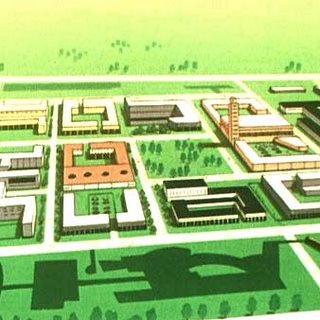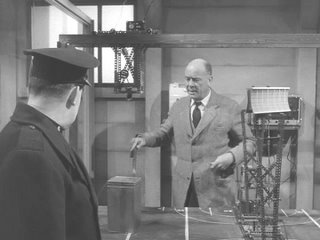 "And a pub right next door to me"... "Oh no you don't."
"And a pub right next door to me"... "Oh no you don't."

The National Archives Research, education & online exhibitions Exhibitions Public Information Films
Another Central Office of Information film, or more correctly, cartoon. Entitled 'New Town', it features Charley, a young cockernee gent on a bicycle extolling the virtues of his choice of a New Town to live in over his old home in the city. Made in 1948, this film presumably attempted to drum up demand for relocation from dirty old London to a nice, clean rational New Town. Quite excellently, it represents the growth of the New Town as being something akin to a 1940s version of Sim City, with isometric buildings and roads dropped into place on a pleasing grid pattern. Witness the city as described in this film: It's an almost exact representation of the London that George Orwell wrote about in 1984, completed the same year. It also mentions Community Centres and 'Hostels where the young people can get together'.
Charley complains of the hour it took him to get to work in the city, dragging himself into his office to a funeral dirge. As he puts it:
"Well, one day I was proper fed up with it all. It seemed to me we had made a real mess of things in our town. Still, if you can make a muck-up of things you can put them right. Boy, that's when I had a great idea. But. I wasn't the only one - oh no!"
Charley rises into the air and bursts through the roof of his workplace, to be followed by others across the city. There are obvious visual parallels here with pictorial representations of The Rapture in contemporary evangelical christian literature, with God lifting the chosen out of the strife and trouble of the earth as the apocalypse arrives. The film, therefore, seem to present the City as a kind of hell-on-earth, a mess of structureless and unplanned expansion which can be escaped by reaching the New Town in which Charley has made his home.
A further interesting point: The city and its spread into the countryside is described and represented as the spread of a disease, even going so far as to depict it as a kind of horrid amoeba only being repulsed and/or contained by the greenbelt surrounding it. When one of the characters in the film suggests moving beyond the greenbelt, it is represented on screen as if the release of spores ready to travel outward an contaminate the rest of the land.







